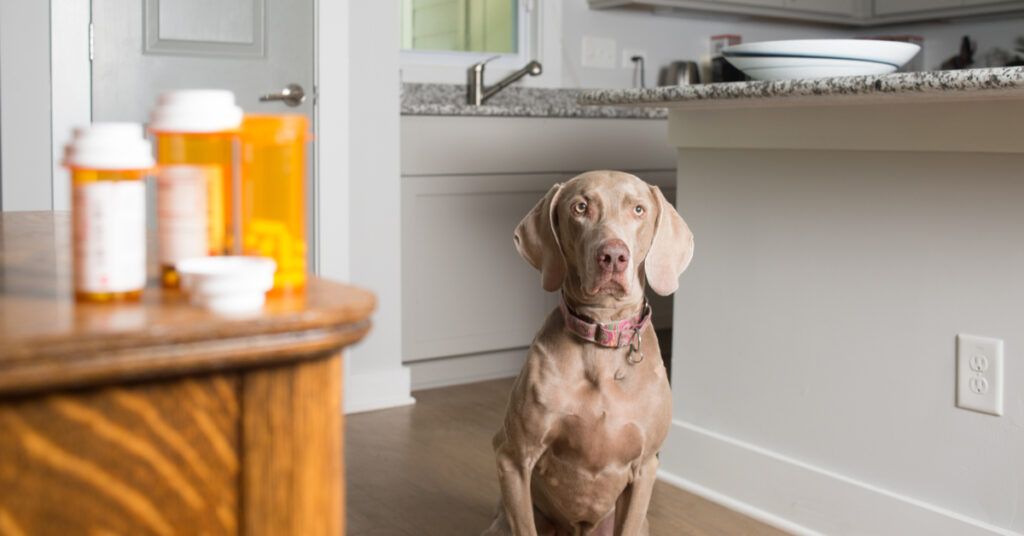It goes without saying that dogs are a big part of our lives. And when they get sick, it’s our natural instinct to do everything in our power to take care of them. Even the simplest ailments like an upset stomach, uncomfortable rash, or allergic reaction to a plant or food compel us to find a quick fix to get them feeling their normal, happy selves again. You’ve tried the natural remedies, but what about human medications? Can you give human medicine to dogs?
It depends. There are a few over-the-counter medications that are safe for treating various dog ailments, but you must follow your veterinarian’s advice. If you’re in a pinch where you can’t contact a veterinary professional (perhaps camping, in a remote cabin, or hiking), these remedies are available without a prescription.
Please note: While we may refer to the following list of medications as “safe,” never, under any circumstances administer any of these drugs to your dog without permission and dosage instructions from your veterinarian.

Allergies: Benadryl
“Benadryl works well if your pet has an allergic reaction, but only if your vet says it’s OK to use,” Veterinarian Marty Becker told ABC News.
With the proper dosage according to your dog’s body weight (and approved by your veterinarian), Benadryl can be a great way to relieve your dog’s allergies or allergic reactions to insect bites or food. As an antihistamine, it works to block H-1 receptors, thereby reducing allergy symptoms like hives and inflammation. It’s sometimes used for anxious dogs during loud and scary occasions like the Fourth of July.
The rule of thumb for dosage is 1 milligram per pound of bodyweight, given 2-3 times a day. One dose for a 50-lb dog, for example, is two tablets.
Decongestants Claritin or Zyrtec may also be used. Again, consult your veterinarian.

Induce Vomiting: Hydrogen Peroxide
Your dog is bound to eat something they’re not supposed to at some point in its lifetime. Whether it’s a poisonous plant, a bottle of your prescription medication, or an entire tennis ball, it’s important to get it out of their system before more serious damage can occur. That’s where hydrogen peroxide comes in.
“Hydrogen peroxide can be used to induce vomiting if your pet has gotten into something that they shouldn’t have. It’s very important to use the 3% solution — this information is right on the label,” says Becker.
Upset Stomach: Pepto-Bismol
“For an upset stomach, you can use Pepto-Bismol for dogs, but never cats. Pepto-Bismol contains an aspirin-like substance that cats can’t tolerate,” notes Becker.
If you aren’t comfortable with the idea of giving your dog the pink stuff, try giving them a spoonful of pumpkin or plain greek yogurt. Pumpkin helps keep dogs regular and prevents constipation, and greek yogurt has tummy-friendly probiotics to help with any digestive issues.
If your dog gets carsick, Dramamine (diphenhydramine) can be helpful to prevent motion sickness and nausea.

Pain: NSAIDs and Natural Remedies
Non-steroidal anti-inflammatory drugs (NSAIDs) are quite common pain relief medicine for dogs and people. Veterinarians typically prescribe ones like gabapentin or carprofen.
Human pain relievers found in the medicine cabinet like ibuprofen (Advil or Motrin), naproxen (Aleve or Midol), or acetaminophen (Tylenol) should never be given to your pet. These medications are toxic to dogs and could cause serious side effects like stomach ulcers, kidney failure, high blood pressure, and increased heart rate.
If you think your pet has some sort of medication toxicity, call the 24/7 ANIMAL POISON CONTROL CENTER at (855) 764-7661
Natural pain remedies and supplements that are safe for dogs include glucosamine chondroitin, fish oil, and curcumin. Dr. Katie Woodley, The Natural Pet Doctor, teaches you exactly how to use these effectively in this blog post: Natural Pain Relief for Dogs.
Stop bleeding with corn starch or all-purpose flour

Dr. Becker said: “[Corn starch and all-purpose flour] are great to stop minor bleeding, such as around your pet’s nails. Just pack it on.”
If you are trimming your dog’s nails and accidentally cut the quick, expect a lot of blood. If you don’t have a styptic powder like Kwik-Stop to stop the bleeding, check your pantry. Flour or cornstarch will work just as well to stop the flood of blood.
Cleaning Wounds: Contact lens saline solution
According to DVMs Ryan Llera and Ernest Ward, pet owners may use a gentle contact lens saline solution to clean dog wounds and hot spots. If you don’t have any on hand, you can make your own saline solution spray by combining one teaspoon of salt with two cups of warm water.

Tread lightly
We’ll say it again: when it comes to human meds for pets, always talk to a veterinarian first. If you give your dog the wrong otc medication, you could be risking its life.

